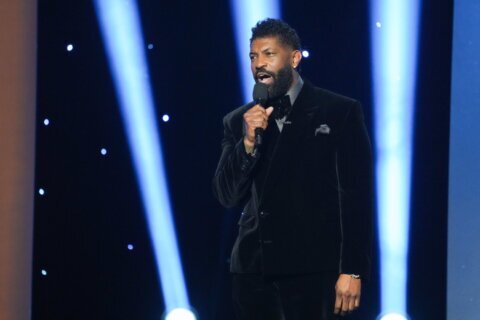WASHINGTON — At the 2013 premiere of Netflix’s “House of Cards,” Kevin Spacey and Robin Wright told WTOP that they modeled their Frank and Claire Underwood roles after the ultimate power couple, Macbeth and Lady Macbeth.
Indeed, D.C. politics offers uncanny parallels to William Shakespeare’s bloodiest power seekers, now on full display in Shakespeare Theatre Company’s production of “Macbeth” (April 25–May 28).
“We spend a lot of time, particularly in this town, looking at people who we think are tyrants, but we never look at how they become that way,” lead actress Nikkole Salter told WTOP. “No one starts that way. Where does that ambition begin? What kind of mind frame are they in that allows them to pursue that path and to what end? … It’s a continuum that we’re all a part of … the ways in which we rationalize and justify our behavior to assuage our own pain, our own inadequacies, our own lusts.”
Penned in 1606, “Macbeth” unfolds during a time of civil war, as skilled army general Macbeth (Jesse J. Perez) and his artful wife Lady Macbeth (Salter) conspire to commit a string of murders to become the king and queen of Scotland, only to tragically plunge into madness (“Out, damned spot”).
“They’re madly in love,” Perez told WTOP. “He’s a great general. … As he’s out there on the heath after this great war that they thought they were going to lose, along come these three people that whisper in his ear that he’s going to become a Thane of Cawdor and then be king. … The ambition is sparked … whatever it takes, and with his wife’s support, they decide to go on a bloody trail to get to the top.”
Such themes of ambition are interpreted through the future-present prism of director Liesl Tommy, who directed Lupita Nyong’o in Broadway’s “Eclipsed,” becoming the first African-American woman to earn a Tony nomination for best director. Having grown up during apartheid in Cape Town, South Africa, Tommy found a personal touchstone from which to interpret this centuries-old tale of power.
“I’m originally from South Africa, so my point of view was shaped a certain way,” Tommy said. “When I was doing the interrogation of the script, I thought, … ‘Who are the witches whispering in a general’s ear to kill the king or president or prime minister?’ … If we’re placing this in North Africa in an oil-rich region, people who want to influence the leadership on that continent are usually Western interests. They want a puppet leader that they can control. … So, that became the structure of our production.”
Tommy’s unique perspective and diligent adherence to her vision was refreshing for the actors.
“So many people that I’ve worked with in the past … don’t have a take and don’t have an artistic voice,” Salter said. “So working with someone who actually has a vision makes it incredibly comfortable for you to trust that your contributions are being guided into a cohesive whole that’s going to be badass.”
In addition to her own personal vision, Tommy suggests universal advice for young directors.
“When you see really exciting theater, you’re watching change,” Tommy said. “With characters, an act, a scene, a monologue, a song, you’re tracking change. That’s what makes you lean forward in your seat. … We, in our lives, are always at a crossroads. … You have to make choices, go with your gut and hope for the best. … That’s how I break it down when talking to actors: ‘Who are you at the beginning of the scene? Who are you at the end? And where are you in the scene when that change happens?'”
In the case of “Macbeth,” our own choices tragically intersect with the forces of fate.
“‘Macbeth’ is full of foreboding and dire prophecies,” Tommy said. “That is just part of the lore.”
Adding intrigue is the storied tradition that actors must not say the name “Macbeth” in the theater.
“There’s a long-standing belief that you’re gonna curse your show if you say ‘Macbeth’ in the theater,” Tommy said. “When I was a young actor and I’d say it in the theater, the older actors would always send me out. I thought it was a joke! I was like, ‘You can’t be serious?’ But they were dead serious.”
What happens if actors violate this superstition?
“I think you have to go outside and go around the theater like five times, then knock on the door and someone has to answer the door and let you back in,” Perez said. “There’s a whole ritual. There’s a couple other steps that other theaters do, but you get a free pass when you’re actually performing the play. That’s the only time you’re allowed to say it … when you’re performing it and rehearsing it.”
Surprisingly, the rule even applies when you’re performing in other shows.
“I had the experience just a couple years ago in Berkeley, not doing Shakespeare at all,” Salter said. “I mentioned the name and everyone in the dressing room turned to me and said, ‘Get out!’ I had to go outside, go around the theater, turn around, knock on the door, and someone had to let me back in!”
WTOP urged the cast to get it out of their system while safe in the Glass Enclosed Nerve Center.
“We’re not in the theater now, so we’re safe,” Tommy said before leading her stars in a group chant, fighting back fits of laughter as the three talents shouted in unison: “Macbeth! Macbeth! Macbeth!”
Click here for more into. Listen to the full conversation with the cast and creators of “Macbeth” below:







